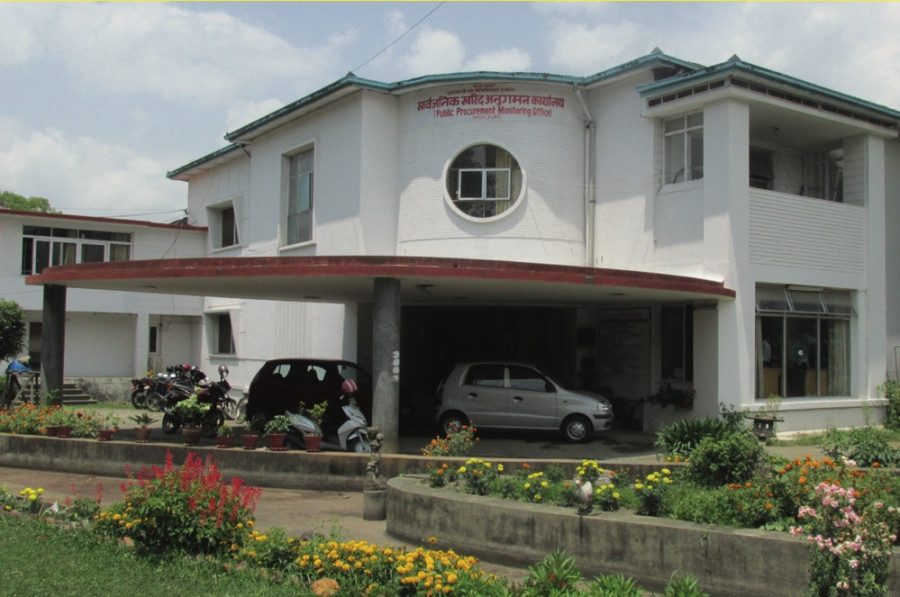Money
Public Procurement Monitoring Office to monitor procurement process online
Office will be able to see whether the officials involved in public procurement are qualified enough to assess bids.
Prithvi Man Shrestha
After setting qualifications for the officials of public entities involved in public procurement, the Public Procurement Monitoring Office is working to ensure that only qualified people are represented in the procurement and evaluation committees of public entities.
The procurement monitoring office is developing a software where public entities should upload the details of their officials at procurement units, evaluation committees, and bodies tasked with contract management. The move is expected to help the procurement office monitor whether qualified people are represented in these bodies.
Public entities must form their procurement units after the fiscal year begins and these units are responsible for developing and issuing bids for procurement. The evaluation committees are formed after bids are received.
“We are preparing to launch a public portal within a week where the public entities need to submit the details of their officials represented in procurement units and evaluation committees,” said Rajesh Kumar Thapa, director at the procurement monitoring office. “This will enable us to monitor online whether the officials are qualified enough to assess bids.”
The Public Procurement Monitoring Office, under the Office of the Prime Minister and Council of Ministers, prepares a standard model of bidding documents, collects statistics of procurement proceedings involving public entities, and provides necessary legal advice to the public entities if needed, among others.
On July 1, the procurement monitoring office had introduced the Standard on Determining Qualification of the Employees Tasked for Public Procurement-2021, which has set certain qualifications to represent the body tasked with public procurement.
As per the standard, the chief of the procurement department or the second person in command at the public entity concerned should normally head the procurement unit.
The members to be represented in the procurement unit should have knowledge about the procurement process based on the nature of procurement. But none of the people represented in the evaluation committee can be part of the procurement unit.
Likewise, the chief of the public entity or a senior officer designated by him/her (preferably a technical officer) should chair the evaluation committee. Chief of the financial administration section of the public entity concerned, technical expert on the subject matter and a law officer of the public entity concerned should represent as members of the evaluation committee.
Anyone invited as a specialist in the evaluation process should have a bachelors’ degree in the area concerned and five years of experience in the sector.
Likewise, the chief of a public entity should assign a person having knowledge about procurement of particular components for contract management by dealing with the contractor, service provider, or suppliers.
As per the Public Procurement Regulations, one of the key tasks of the procurement monitoring office is to ascertain whether the persons appointed to procurement units and evaluation committees possess necessary professional efficiency.
“We are trying to monitor whether the public entities have appointed qualified staff for the procurement process because there is a tendency of making appointments in key positions for personal gains regardless of the appointees’ qualifications,” said Thapa.
According to him, another reason for developing the software for monitoring the procurement process is to ensure that the public entities set up procurement units and evaluation committees on time.
“They need to set up these committees or units right after the fiscal year begins, but we see that many public entities form such teams only after the tender process has moved ahead. This not only delays procurement but also the implementation of development projects,” Thapa, who is also the information officer at the procurement monitoring office, said.
With public entities delaying procurement, the government’s capital spending has continued to remain dismal for years. In the last fiscal year, the capital expenditure of the government stood at just around 65 percent of the total capital budget.
Subas Chandra Shiwakoti, director at the procurement monitoring section of the procurement monitoring office, said most of the anomalies in the public procurement sector are due to malafide intentions of those involved in the procurement process.
“For example, the procurement unit prepares the specification details to suit a certain bidder to undermine competitive bidding. It is not entirely due to a lack of knowledge among officials representing the procurement unit,” he said.




 14.24°C Kathmandu
14.24°C Kathmandu















